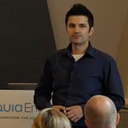You speak of these "silent assistants," these AI scribes diligently capturing our every utterance in the meeting room. One sees the tempting side, of course. The burden of note-taking lifted, insights extracted with algorithmic precision. But one questions the effect on our very presence, our engagement with one another.
Are we not diminished when a machine mediates our conversations? How do we retain the capacity for empathy, for authentic connection, when our words are funneled through a silicon filter, analyzed, and categorized?
Consider the subtle cues of body language, the unspoken emotions that ripple beneath the surface of a discussion. Can an algorithm truly comprehend these nuances, or does it reduce us to mere data points, devoid of complexity and depth? The essence of human interaction lies not merely in the words we speak, but in the shared experience of being together, a presence that digital tools, as beneficial as they might seem, only serve to dilute. A profound question begs asking where does authentic human connection end and technological mimicry start?
Technology whispers of efficiency, but what becomes of our humanity in the relentless pursuit of optimization? One feels a sense of urgency, a compelling reason to reclaim our interactions, to resist the seduction of these silent assistants, and to rediscover the art of genuine, unfiltered communication.
